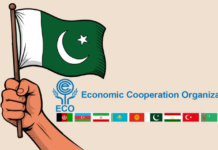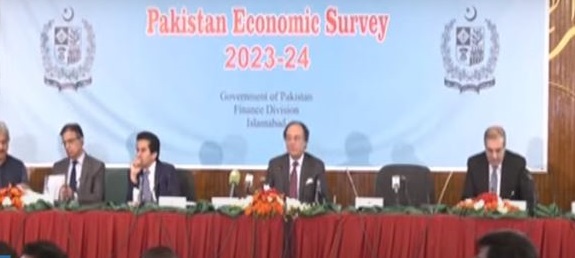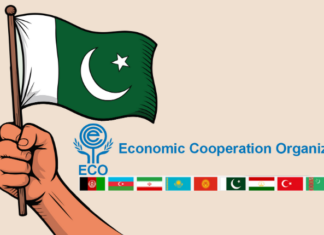ISLAMABAD: The Economic Survey of Pakistan for 2023-24, an essential pre-budget report detailing the country’s significant socio-economic developments over the past fiscal year, has been unveiled by the Finance Minister Muhammad Aurangzeb.
Aurangzeb revealed that Pakistan’s GDP had contracted, and the rupee had depreciated by 29% during the 2022-23 financial year. He underscored the critical need to engage with the IMF, labeling it as the lender of last resort, stating, “We must go with IMF as there is no plan B.”
The government has shifted its focus to sectors with high growth potential, such as IT, small and medium enterprises (SMEs), mining, tourism, exports, and agriculture. Aurangzeb emphasized that without IMF support, the economic scenario would have been drastically different. He stressed the urgency of securing the next IMF loan, acknowledging the difficulties faced by the large-scale manufacturing (LSM) sector due to inflation and high energy costs.
Aurangzeb highlighted the agricultural sector’s robust performance, noting that a bumper crop had significantly contributed to GDP growth. He also pointed out the ongoing challenges since FY 2022.
Revenue collection saw an unprecedented 30% increase during the fiscal year, which Aurangzeb attributed to provincial surpluses that facilitated the achievement of the IMF’s nine-month standby arrangement. He noted that the economy began stabilizing in FY 2024, with nearly 30% growth in revenue from the Federal Board of Revenue (FBR) and provincial contributions aiding the federation.
The current account deficit (CAD), initially projected at around $6 billion for FY24, is now expected to be under $1 billion by June 30, potentially as low as $200 million. Workers’ remittances, amounting to $3.2 billion, are anticipated to keep the current account in surplus for the full fiscal year.
Aurangzeb praised the government’s measures to curb smuggling and misuse of the Afghan transit trade and commended the State Bank of Pakistan (SBP) for stabilizing the rupee by phasing out weaker exchange companies and supporting banks in opening exchange companies, marking a structural shift.
The economy has seen moderate growth and reduced external pressures. Aurangzeb assured that speculative activities in the rupee-dollar market would not resurface, citing administrative measures by the SBP.
He mentioned that foreign exchange reserves stand at $9 billion, sufficient to cover two months of imports. Aurangzeb highlighted the IT sector’s role in driving economic growth and enhancing citizens’ quality of life through digital transformation.
He stressed the importance of investment as a crucial driver of economic growth, noting that Pakistan’s investment rate is relatively low and declining. He reported a drop in core inflation to 11.8% in May and a reduction in food inflation, with expectations of monetary easing.
The services sector has consistently maintained the largest share of GDP at 58% for several years. Aurangzeb expressed optimism about the monetary policy, predicting a single-digit policy rate in the next fiscal year.
Discussions with the IMF were described as productive and constructive. Aurangzeb reported an 11.6% increase in wheat production, reaching 31.44 million tonnes compared to 28.16 million tonnes last year.
This survey comes ahead of the federal budget for the fiscal year 2024-25, which is set to be presented on June 12 (Wednesday).
Officials and analysts suggest that the coalition government, led by the Pakistan Muslim League-Nawaz (PML-N), plans to set ambitious fiscal targets in Budget 2024-25 to support its case for a new IMF bailout deal.
Despite severe financial constraints and reduced development funding under the IMF programme, the Annual Plan Coordination Committee (APCC) has recommended Rs1,221 billion for the federal development programme for 2024-25.
This will be the first budget presented by the current government. As Pakistan seeks a loan programme to avoid default amid a sluggish economy, the IMF has urged the country to increase provincial taxes, particularly on agriculture, sales tax on services, and property tax.
Pakistan is negotiating with the IMF for a loan estimated between $6 billion to $8 billion to prevent a default in an economy growing at the slowest pace in the region.
Last summer, Pakistan narrowly avoided default thanks to a short-term IMF bailout of $3 billion over nine months. Although fiscal and external deficits have been controlled, this has resulted in a significant decline in growth and industrial activity, coupled with high inflation, which averaged nearly 30% in the last financial year and 24.52% over the past 11 months.
The growth target for the upcoming year is expected to be 3.6%, up from 2% this year, following economic contraction last year.
Since the February 8 general elections, Premier Shehbaz has publicly committed to implementing tough reforms. However, high prices, unemployment, and a lack of new job opportunities have exerted political pressure on his coalition government.
Another critical aspect of the budget will be the targets set for proceeds from privatisation.
Pakistan plans to make its first major sale in nearly two decades by selling a stake in its national airline. This is expected to be the first in a series of sales of loss-making entities, particularly in the struggling power sector.
























